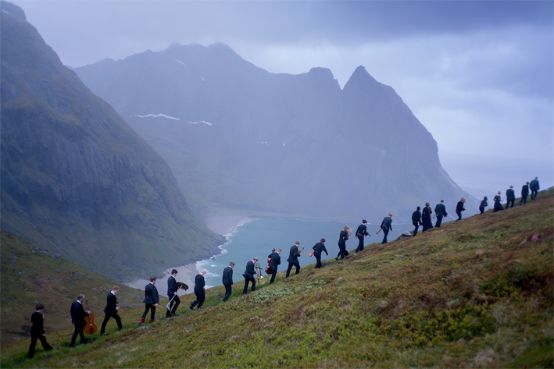Classical music as a global export
Impressions from the Berlin Avant Première, the annual presentation of new music films.

Now I understand why I was advised to sit on a chair without a backrest. I'm in the middle of the turbulent second act of the Figaro and have to constantly turn on my own axis. Around me, Susanna, the Countess and the jealous Count Almaviva are negotiating the irritating fact that it is apparently Susanna and not Cherubino who is hiding in the Countess's dressing room.
But stop! Of course I'm not sitting on stage. It's an illusion, and I owe it to the VR glasses that Jan Schmidt-Garre put on me. They catapulted me into a virtual reality. That with 360° Figaro The experienced film author and opera director realized this experiment at the intersection of art and technology as an in-house production; partners in the 200,000 euro project were the Leipzig Opera and the Fraunhofer Heinrich Hertz Institute in Berlin, which developed the 360-degree camera.
The end product is overwhelming - total immersion. But it's also exhausting: when you take the glasses off after 25 minutes and the trip is over, you feel slightly dizzy. From a sober point of view, it is also not for a mass audience, if only because you would have to buy these VR glasses first. What's more, you are completely thrown back on yourself when enjoying this kind of art. Schmidt-Garre knows this. He is a realist and sees the production as a unique experiment in the field of media communication of opera. Perhaps in ten years' time people will look back on it as a pioneering achievement.
That was one of the many interesting experiences to be had at this year's Avant Première in Berlin could make. Organized by the International Music and Media Center Vienna (IMZ), the preview of new music films in the fields of classical music, ballet and jazz brings together producers, distributors and TV broadcasters from all over the world to view, show, buy and sell new releases. The majority of the more than six hundred participants come from Europe, but increasingly also from America and the Far East. Public broadcasters are facing increasing competition from private broadcasters, and for the first time, two powerful state-affiliated players of a completely different kind were also present: the China Intercontinental Communication Center and the Moscow Philharmonic Society.
Beyond the live performance
Digital media have turned European classical music into a global export. Beyond the minority who have access to exclusive live performances, a new consumer class is growing up, estimated at four to five hundred million worldwide. Rob Overman, program manager at the media group Stingray. The Canadian company is now one of the big players in the international classical music market. Among other things, it has acquired the rights to the recordings of Unitel, the classical music treasure trove initiated by Leo Kirch, and purchased the associated music channel Classica.
Through its own apps and global providers such as Amazon and Comcast, Stingray now has access to half of all pay-TV households worldwide and not only provides them with Aida, Nutcracker and Beethoven's Ninth, but also with interesting minority programs. Thanks to new technologies, the business has been standardized and works according to the Netflix video-on-demand principle. Whether in Beijing, Paris or Ottawa, you can take out a subscription directly on the screen. Unnoticed by the concertgoers in the Tonhalle and Elbphilharmonie, Europe's musical high culture has thus become a premium object in a globalized media landscape. This is not without consequences for our traditional concept of music.
The material for this global market consists first and foremost of the constantly renewed large number of opera and concert recordings: the crowd-pleasing spectacle of conductors and, more recently, female conductors - dozens of times you get to see the grandiose ruler gesture when striking a fortissimo final chord - and the sharply observed love scenes on the opera stage. Juan Diego Flórez and Anna Netrebko are big hits. But there are also auteur films with a strong message. For example, the magnificent visualization of Edgar Allan Poe's story A Descent into the Maelstrom (Down into the Maelström) by the Norwegian film author Jan Vardøen to the suggestive music of Philip Glass.
Beyond the mainstream
The global mainstream offering is also counterpointed by the regional perspectives of smaller broadcasters such as Slovenian Television, which can draw on an astonishing wealth of its own cultural traditions. RSI television in Ticino also offers an individual touch. Instead of pure classical recordings, today they want to focus more on contemporary phenomena, which is also reflected in an original television documentary such as Un Barbiere a Lugano in which Rossini's legendary hairdresser makes an excursion into everyday life. RSI has also produced a documentary about Cecilia Bartoli, the first since 1993 about the prima donna, who is rather reserved off the stage. It came about through the conductor Diego Fasolis and is an international sales success. The Ticinesi show that it is possible to work successfully with a small budget. You just have to have the right ideas.








